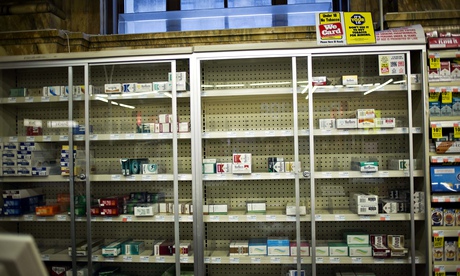
The CVS decision announced today to stop selling tobacco products at its 7,600 pharmacies around the United States by 1 October is an important step forward for public health – and for tobacco control activists.
According to Forbes, CVS CEO Larry Merlo believes that
continuing to sell cigarettes, which the Surgeon General blames for 480,000 deaths every year from heart disease, lung cancer, and stroke, was anathema to CVS' long-term plan to become a central player in the US healthcare system.
The CVS decision demonstrates that over time, health activists and public opinion can change corporate managers' profit-loss calculus. CVS predicts it will lose $2bn of $125bn in annual revenues.
Perhaps ironically, a big chunk of CVS sales come from medications and supplies needed to treat chronic conditions caused by tobacco, alcohol and unhealthy food consumption. The World Health Organization has identified these three products as primary causes of the growing epidemics of diabetes, heart disease and cancer. By 2030, experts predict, these diseases, which already cause more than 60% of all deaths worldwide, will cost the global economy an estimated $47tn.
From a public health perspective, the CVS decision is good news because research shows that the ubiquity of unhealthy products contributes to their overuse. The more places people can purchase and consume alcohol, tobacco, sugary beverages, salty snacks and fast food, the more they ingest. Alcohol, tobacco and processed food corporations know that easy access triggers the cravings or addictions their products are designed to elicit. Normally, they vociferously oppose any limits on their right to put their wares within arm's reach. The decision by the nation's second largest pharmacy chain to choose a different path shows that public mobilization, changing social norms and regulation can combine to persuade at least some companies to choose the high road.
So maybe the next step for CVS and similar chains is to get rid of the candy, soda and snacks that contribute so significantly to diabetes. Maybe cities and states that want to protect young people from painful illnesses and premature death can use their zoning laws to limit the number of outlets selling unhealthy products. Alcohol, food and tobacco corporations will, of course, raise the bogeyman of the nanny state, suggesting that any effort to limit access to sickening products interferes with our freedom and absolves individuals of their responsibility to protect their health.
But that argument is silly; no one is suggesting prohibition. Isn't enticing children and young people to consume products that put them at risk of premature death and preventable illness the height of irresponsibility? Wouldn't most societies charge a nanny with child abuse if he or she tried to bypass parents to encourage children to begin risky habits? By looking for additional ways to persuade companies that the public will not tolerate profiting from selling disease, we encourage more corporate leaders to do the right thing.

